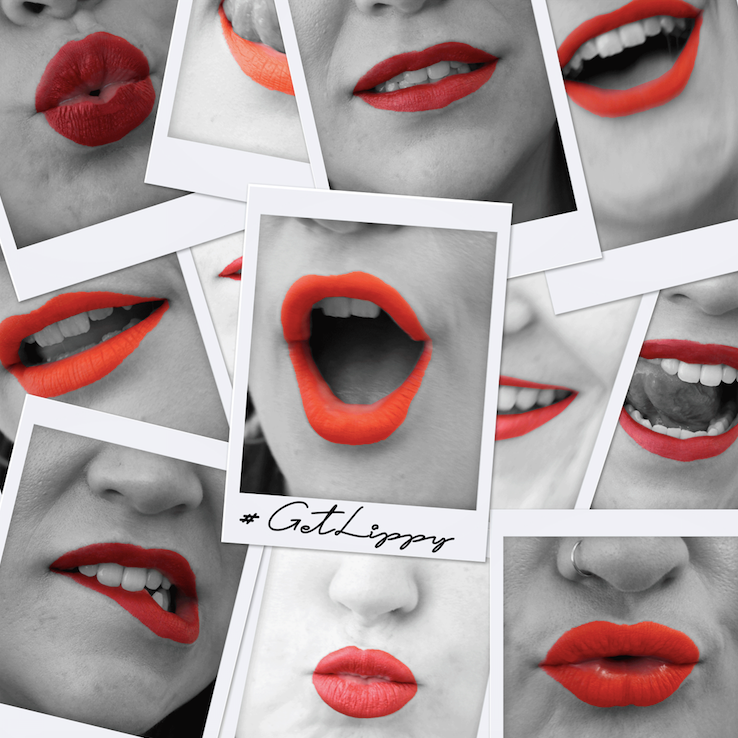New research shows that women are potentially putting their lives at risk because they aren’t equipped with the right language to talk about their bodies with doctors. The Eve Appeal has launched its national #GetLippy campaign to provide women with the right information and confidence to talk clearly about anatomy and symptoms in order to better diagnose key health concerns, including the five gynaecological cancers. Today, team LiB will be smashing gynae taboos often associated with gynae health to aid awareness and help you all to feel comfortable talking about your bodies while being able to recognise when things may not be quite right. We’re smashing taboos surrounding smear tests, periods, sex and the words that are often avoided when speaking about anything vagina. JOIN US! (Oh, and donate to the cause by purchasing our #GetLippy Box!)

CERVICAL – LET’S TALK SMEAR TESTS
In recent times, cervical (did you know it’s pronounced cer-via-cal and not cer-vi-cal?) screenings have become a taboo subject that women cringe at the thought of. We’re here to smash that! Having a bad rep for being embarrassing, painful and awkward, a smear test is scarily avoided by many women year-on-year. Having a smear test is the number one prevention for cervical cancer, which is cancer of the cervix – connecting a woman’s womb and her vagina. Cervical cancer can affect women of ALL ages but affects women primarily 30-45 years of age. In the UK, we have a very successful cervical screening programme which is estimated to save over 4,000 lives each year, but we can’t help wondering how many more lives could be saved if the issues surrounding the smear test were more widely talked about. We reckon it’s a lot. The symptoms of cervical cancer aren’t always obvious, it may not cause any symptoms at all until it’s reached an advanced stage. Some women do not experience any signs of cervical cancer at all. Scary, huh? This is why it’s VERY important that you attend all of your cervical screening appointments. There really is nothing to be embarrassed or afraid of, here are some of our experiences…
“When it came to having my smear, I received my letter quite early on – six months before I turned 25, actually – very thorough indeed! As someone who hadn’t been that sexually active prior to my appointment, I was incredibly worried that it would be even more painful for me and difficult to handle. I was also super anxious over stripping off waist down for a stranger (sounds silly really, because they’ve seen it all before) but I was constantly worrying that I wasn’t normal down there – I’m sure many have felt the same. In fact, this allowed me to put off having my smear for a good while but once I decided to book the appointment and go through with it, I found that getting in a tizz was all for nothing. Haven’t had your smear yet? Do it. No, seriously, it could save your life.”
“I was a little scared about going for the requested smear test. It was extremely uncomfortable and painful – the nurse was really nice and tried her best to ensure it was done swiftly and I was as comfortable as possible. Although I dread the smear test, I understand the importance of it in the long term, so ensure I go whenever necessary.”
“Having had worked with The Eve Appeal for two years, I was very aware of the signs and symptoms of cervical cancers, one of which I was experiencing, bleeding after sex. The Eve Appeal teaches us to be incredibly aware of signs and symptoms of the five cancers and to know your body well so that you can translate your worries to a doctor. After a recent event with The Eve Appeal, I encouraged myself to go to the doctor about this worrying symptom. After one bad doctor experience, I moved on to another specialist who was brilliant. He examined me and told me I had cervical erosion which is in fact very common. I had already had a smear test two years earlier (on Valentine’s Day, romantic!) that had come back with normal results. On the day of my examination I had another smear for precaution. I would encourage anyone who is experiencing any worrying symptoms to speak up, don’t be afraid of speaking to friends or family about it and definitely don’t put off going to see a doctor because you feel embarrassed.”
“Being 23, I haven’t had a smear test yet – which I totally disagree with! I strongly believe that the age for the smear test should be much lower. I have had so many tests down there, mainly down to the hormonal glories of the contraceptive pill, that it totally wouldn’t phase me!”
![]()

KNOW YOUR NORMAL – LET’S TALK PERIODS
Periods. Periods. Periods. Often referred to as the arch nemesis for anyone who menstruates. Other known phrases include: Aunt Flo, Mother Nature, Star Week and Time of the Month, but we’re going to refer to it as our period, because – straight talking – that is what it is and there’s no point making it sound flouncy. Periods are occasionally tough, more so for some than others, and we’re almost certain that we’ve all had our fair share of period horror stories, but periods are normal, and nobody should be ashamed to talk about them. If your period seems abnormal, it’s important to confide in someone about it; whether that be a family member, friend or GP, getting familiar with your cycle will do you the world of good. We’d also recommend tracking your cycle by keeping a period diary, which will help you notice abnormalities when compared to your usual period (heavier bleed, extreme pain, bloating etc).
Did you know that most womb cancers begin in the endometrium (womb lining), where the cells that grow are then shed each month (our period)? When a womb cancer develops, the normal cells change their appearance, increasing in size and shape, until they become cancer cells that divide and grow into a tumour. As the cancer develops, it often causes an unexpected vaginal bleed. However, it’s good to note that womb cancer is more common among post-menopausal women and therefore any vaginal bleeding should be reported to your GP immediately. Yet, if you’re a woman who is still menstruating and experience an unexpected bleed, while it could be a less serious issue e.g. hormonal imbalance, it is still important to see your GP to find the cause of the problem. To help normalise the word period and get the conversation surrounding blood flowing (pun intended), we’re sharing some of our first period stories…
“The story of when I started my period for the first time is a really odd one. I started puberty when I was really young, growing boobs and armpit hair from about 10 years old, so my period came along in the summer between primary school and secondary school – so I was 11 years old. It was so weird for me because, even though I didn’t really feel like I had a clue about periods, I had this intuition that I was coming on for the first time as I had awful back ache and cramps. My parents hilariously thought I was being an over-dramatic pre-teen and didn’t believe me, yet low and behold I woke up the next morning met with a blood stain in my pyjama bottoms and didn’t have a clue how to use a sanitary towel!”
“I was on a water sports holiday when I started my period. I remember being very embarrassed because I was on holiday and obviously in a bikini, and I remember sneaking into my Mum’s bathroom to try and find some tampons or pads or something. I couldn’t find any, so I remember having to go out to my Mum and explain what had happened. I don’t know why I felt awkward – my Mum went straight to the shop in the hotel and all she could find was tampons so I was thrown into the deep end and used tampons straight away, and I could continue enjoying my holiday!”
“I will always remember the day I started my period because my Mum acted like I had won a noble prize (if only). My pain and misery were met with a frenzied parent who couldn’t wait to get me in the car to Tesco to buy me my first sanitary products. I wish I shared her enthusiasm that day. I’ve always suffered with my periods, later leading to a PCOS diagnosis, so it’s never been a pleasurable time of the month for me. When I first came on, I spent the whole afternoon in the bath because it was the only thing that helped. The one thing that shocks me to this day is the fact that it took years of complaining to finally find some answers from a doctor. The first doctor I went to about my excruciating period pain (which stopped me going to school and later, work) could only recommend putting me on the pill, so that’s what I did. During the years that followed, I felt like I was a burden to doctors due to my constant complaining about how unwell my period made me feel. I wish 14-year-old me had the ‘take no bullsh*t’ approach I have now, then maybe I would have got things investigated sooner – however don’t even get me started on trying to get a laparoscopy. I still feel angry that the only way I can control my hormonal imbalance and severe period pain (which joyously comes with terrible bowels) is to be on the pill. I’m apprehensive to come off it.”
![]()
VULVA – GET BLEEDING CHECKED!

We’ve all established that we have – in fact – been referring to our vulva as our vagina. This month, we’re inviting you to join us in making a conscious effort to use the correct terminology when it comes to referencing our anatomy. The vulva describes a woman’s external genitals, including the soft tissue (lips) surrounding the vagina (labia minora and labia majora), the clitoris and the Bartholin’s glands (the two glands each side of the vagina that secrete fluid to enhance lubrication). Cancer of the vulva is one of the rarer cancers, but still one we should be aware of. Around 80% of vulval cancer is diagnosed in women over 60; however, more women are being diagnosed at a younger age. With that in mind, we urge you to CHECK IT. Wherever, whenever you feel comfortable (maybe Shakira should write this into her song). Grab a mirror (we LOVE TOTM’s Be Kinder To Your Vagina Compact in our #GetLippy box!) and check for any abnormalities such as thickened, raised, red, white or dark patches on the skin of the vulva, an open sore or growth visible on the skin, a mole on the vulva that changes shape or colour, or a lump or swelling in the vulva. Other symptoms can include a lasting itch, pain or soreness. So, when was the first time team LiB looked at their vulva?
“The first time I looked at my vulva in the mirror was when I had a water infection and wasn’t sure how bad it was; whether I could pop to the pharmacy and get over the counter medicine or whether I had to book a doctor appointment. I think it’s always good to check how your vulva looks if you have any pain or uncomfortable symptoms!”
“If we’re honest with each other, we undoubtedly all looked at our vulvas so early on that we can’t really pinpoint the exact moment. I’m sure I was that three-year-old that sat fiddling with their bits wondering what they did. I could have made that up, I’d have to ask my Mother. On a serious note, I remember checking my vulva in my early teens when I was experiencing an itch; an itch more severe than the result of a shave let me tell you – you all feel me here. Right? Turns out I could spot some white cottage cheese like discharge (another thing we need to normalise), which was later revealed as thrush. Whether it’s something easily treatable, or something you’re not sure is normal, get it checked and get used to checking yourself, too. Doctor’s really have seen it all and every vulva looks completely normal – albeit all different -, despite the tricks your mind plays on you”.
“I remember my Mum telling me it was time to take a look, I think perhaps I was around 12 years old and asked how wee and a baby come out of the same hole…. she rolled her eyes and passed me a hand mirror. I went and sat on the toilet, pulled the mirror out and was a little shocked.. WHAT WAS ALL OF THIS?! I kind of poked and prodded around and thought.. gross. But now I know it’s not gross, it’s NORMAL and nothing to be embarrassed about.”
![]()

Not only have we been brought up saying vagina instead of vulva, it seems that we all had other names for our ‘lady garden’ (see, there’s another!), and these are only a small sample of alternative vagina references – a quick google will show up many more. The #GetLippy campaign this year is all about ditching the indirect terms by becoming familiar with your body and using the correct terminolgy. As one of the LiB girls said: ” it’s so important to pucker up, pout and shout VULVA out loud to make the word less awkward; the more we say it, the more normal it will become and the more comfortable we’ll all be when referring to our anatomy when it’s crucially needed'”. We also urge you to become familiar with the five gynaecological cancers by shouting them out loud: Cervical. Ovarian. Vaginal. Vulval. Womb.
SMASH THE TABOOS, JOIN THE CONVERSATION ON TWITTER #GETLIPPY.
Don’t forget to buy your LiB x Eve Appeal #GetLippy Box for £25 and donate 10% straight to the charity.



